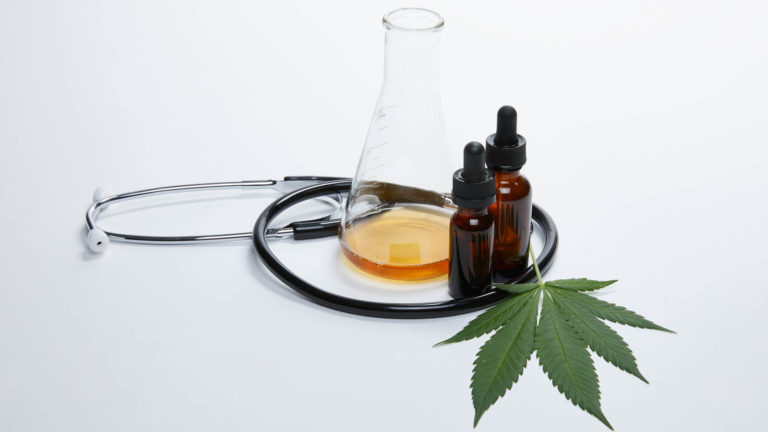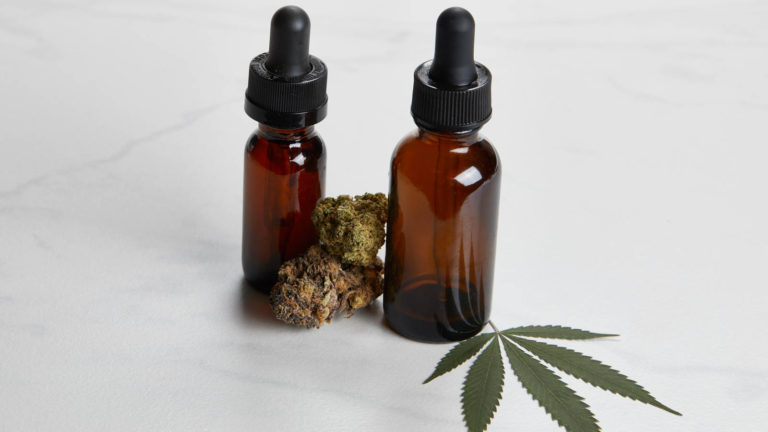Mississippi is one of only three states in the US that hasn't embarked on an industrial hemp program. The state maintains a prohibitive stance in relation to cannabis. Following the passing of HB 1547 in July 2019, CBD became legal in Mississippi, but CBD products must comply with very strict state restrictions.
Medicinal low-THC cannabis products became available to eligible patients in 2014. Qualifying patients are only able to procure low-THC cannabis from the University of Mississippi's Medical Center's Department of Pharmacy Services. Adult-use cannabis is illegal.
What is CBD?
CBD is a non-intoxicating cannabinoid found in cannabis and the second-most prominent in the plant after THC, which is largely responsible for producing an intoxicating high. CBD can be sourced either from marijuana or hemp plants and has a wide range of potential therapeutic benefits.
 Photo by: Gina Coleman/Weedmaps
Photo by: Gina Coleman/WeedmapsImage lightbox

To date, researchers have identified a number of potential applications linked to CBD, including anti-inflammatory, analgesic, anti-anxiety, and anti-seizure properties. Further, the chemical has shown promise in treating numerous health conditions, including seizure disorders, mood disorders such as depression, anxiety, and psychosis, chronic pain, and many more.
Most raw cannabis strains on the market today contain small amounts of CBD, especially compared with THC. But since the cannabinoid has gained considerable attention for its wide range of purported therapeutic benefits, more high-CBD strains have recently been cultivated.
Why is CBD sometimes illegal?
All types of cannabis, including hemp strains that don't produce enough THC to cause intoxication, were considered illegal under the Federal Controlled Substances Act of 1970. The law categorized all cannabis as Schedule 1, which defined the plant as a highly addictive substance with a high potential for abuse and no accepted medical use.
The 2018 Farm Bill re-classified hemp as an agricultural commodity and made its cultivation federally legal. Further, the act removed some forms of cannabis from Schedule 1 status by creating a legal distinction between hemp and marijuana. Hemp is cannabis with less than 0.3% THC, and marijuana refers to cannabis with more than 0.3% THC. This distinction in federal law effectively legalized CBD that is derived from cannabis with less than 0.3% THC, as long as it has been cultivated according to federal and state regulations.
The 2018 Farm Bill legislation does not mean that CBD derived from hemp is universally legal throughout the United States. According to the Farm Bill, the Food and Drug Administration (FDA) has the power to regulate CBD product labeling, including therapeutic claims and the use of CBD as a food additive.
The FDA has declared that even hemp-derived CBD may not legally be added to food and beverages, or marketed as a dietary supplement. Although the organization has begun to re-evaluate some of its stances on legal CBD products, the FDA has not revised its regulations. The agency also has been strict in its position against any labeling that could be perceived as a medical claim about CBD.
In addition to the federal regulation of CBD, the Farm Bill also gave states the option to regulate and prohibit the cultivation and commerce of CBD. States may also regulate CBD in food, beverages, dietary supplements, and cosmetic products independently, even before the FDA finalizes its policies.
Mississippi CBD laws
Mississippi has one of the most restrictive stances towards cannabis in the country. Recreational marijuana legalization efforts have failed in committee, even though several bill proposals have been presented in the last few years.
 Photo by: Gina Coleman/Weedmaps
Photo by: Gina Coleman/WeedmapsImage lightbox

Current Mississippi law allows for the medical use of low-THC cannabis for patients with qualifying conditions. Gov. Phil Bryant signed HB 1231, “Harper Grace's Law” in 2014 to enable patients who suffer from severe epileptic conditions to use and possess CBD oil or resin that contains at least 15% CBD and no more than 0.5% THC by weight. Patients can procure low-THC cannabis by doctor's recommendation and obtain it from the University of Mississippi's Medical Center's Department of Pharmacy Services. All CBD products under this law must be grown by the University of Mississippi's National Center for Natural Products Research.
In 2017, lawmakers passed SB 2610, which allowed the use of CBD in the research of treatment of seizures and other medical conditions but did not legalize it more broadly.
Following both the 2014 Farm Bill and the more recent 2018 Farm Bill, Mississippi lawmakers chose not to launch a state-regulated industrial hemp program. The state's only response to the federal change was the passage of HB 1547 on July 1, 2019. This law legalized CBD products, but they must contain at least 50 milligrams of CBD per milliliter, with no more than 2.5 milligrams of THC per milliliter. The product must have a minimum ratio of 20:1 CBD to THC.
HB 1547 also established the Mississippi Hemp Cultivation Task Force. This team, led by the Commissioner of Agriculture and Commerce, was tasked with undertaking a comprehensive study of hemp's potential costs and benefits. This clause of the law has a sunset date of July 1, 2020, so the team is expected to make recommendations by this time.
Licensing requirements for CBD
Mississippi does not allow for state-licensed hemp growers or processors. Depending on the FDA's forthcoming hemp regulations and the findings of the Mississippi Hemp Cultivation Task Force, the state may create a licensing system.
All CBD products created in Mississippi must be lab-tested by the University of Mississippi before they are distributed by the Medical Center's Department of Pharmacy Services.
There are no testing requirements for CBD products made outside of Mississippi, so long as they meet the regulations outlined in HB 1547.
Mississippi CBD possession limits
The possession of any quantity of CBD is legal as long as the product meets the legal state specifications.
Mississippi's strict definition of CBD is met with active law enforcement. Possession of any amount of CBD with more than 2.5 milligrams of THC per milliliter is punishable by Mississippi law. Mississippi police are likely to arrest for possession if a product looks like marijuana.
 Photo by: Gina Coleman/Weedmaps
Photo by: Gina Coleman/WeedmapsImage lightbox

The first offense for possession of fewer than 30 grams of cannabis is a fine of $250, while subsequent offenses are classified as misdemeanors that can earn up to six months in prison and a $1,000 fine.
Possession between 3-250 grams is a felony, earning up to three years' incarceration and a fine of up to $1,000. Between 250-500 grams earns up to eight years and a maximum $50,000 fine. Possession of 500 grams to one kilogram results in up to 16 years in prison and a fine of up to $250,000. Between 1-5 kilograms earns up to 24 years in prison, and a fine of $500,000, while more than five kilograms is punishable by 30 years imprisonment and a $1M fine.
Where to buy CBD in Mississippi
Mississippi consumers can purchase hemp-derived CBD products from CBD-specific stores. When purchasing from a brick and mortar store you can typically receive guidance from an employee. Explain what you're looking for, your reasons for consuming CBD, and they can point you in the right direction.
When it comes to online sales, CBD is most frequently found on brand-specific websites. You can also find verified CBD brands on Weedmaps. Reputable brands will generally provide you with essential product details, including the form of the CBD (such as oil, capsules, topicals, tinctures, etc.), the quantity of CBD the product contains, the other chemicals or ingredients present in the product, and more.
How to read CBD labels and packaging
The 2018 Farm Bill shifted the oversight of hemp and hemp-derived products from the U.S. Department of Justice (DOJ) to the U.S. Food and Drug Administration (FDA). The FDA does not presently allow CBD-infused food, drinks, or dietary supplements to be sold, and hasn't yet provided regulations for hemp-derived CBD products.
Still, the agency warns that regulations in flux still require companies to make legitimate claims on their labels. Buyers should nonetheless approach CBD products with caution. A CBD product should clearly state what kind of CBD is used. Full-spectrum CBD oil means the extract contains cannabis-derived terpenes and trace amounts of cannabinoids such as THC. Broad-spectrum also includes other cannabis compounds but has had THC removed during the processing phase. CBD isolate is a pure crystalline powder containing only CBD.
Most reputable CBD producers typically include the following information on their CBD product labels:
- Amount of active CBD per serving
- Supplement Fact panel, including other ingredients
- Net weight
- Manufacturer or distributor name
- Suggested use
- Full-spectrum, broad-spectrum, or isolate
- Batch or date code

